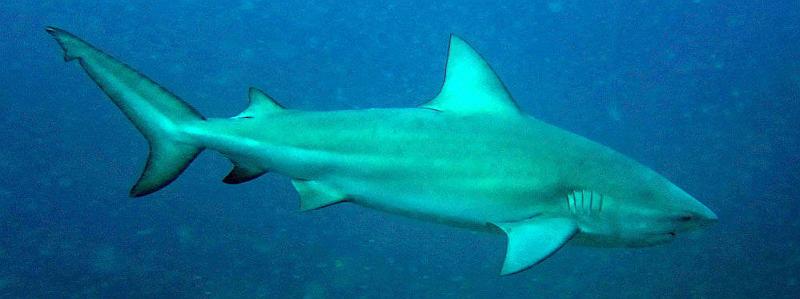
Bull Shark — Photo: Chaloklum Diving
The BBC reports that several popular beaches in Sydney, Australia have been closed after sharks attacked a dolphin in waters near the city. At least two bull sharks were spotted in the Shelly Beach area, in northern Sydney, after the attack and authorities closed all nearby beaches as a precaution. The injured dolphin circled the shallow waters but eventually beached and died.
Manly Open Surf, a carnival taking place at the beach over the weekend, has been suspended. Lifeguards cleared people from the water after the attack, which happened at around 07:00 local time on Saturday (20:00 GMT on Friday). Hundreds of people had been about to compete in the festival.
What are the risks of being attacked by a shark?
What are the actual risks of being attacked by a shark when swimming in the ocean? It turns out that the risks are quite low. The Florida Museum of Natural History’s International Shark Attack File (ISAF) investigated 137 alleged shark-human interactions worldwide in 2021. ISAF confirmed 73 unprovoked shark bites on humans and 39 provoked bites.
The ISAF reports that the 2021 worldwide total of 73 confirmed unprovoked cases was in line with the most recent five-year (2016-2020) average of 72 incidents annually. However, unprovoked case numbers were significantly down in 2020, which they attribute to lockdowns associated with the pandemic.
The US leads the world in unprovoked shark attacks
Consistent with long-term trends, the United States recorded the most unprovoked shark bites in 2021, with 47 confirmed cases. This is 42% higher than the 33 incidents that occurred in the U.S. in 2020. The 47 cases represent 64% of the worldwide total. This represents an increase from 2020 when 58% of the worldwide unprovoked bites occurred in the U.S.
Australia’s total of 12 unprovoked incidents was lower than the most recent five-year annual average of 16 incidents for the region. Six bites occurred in New South Wales, two of which were fatal. Four bites occurred in Western Australia, one of which was fatal. Single incidents occurred in Queensland and Victoria.
Brazil, New Zealand and South Africa all had three bites and one fatality each in 2021. New Caledonia reported two incidents, both of which were fatal. Single incidents occurred in Canada, Ecuador and St. Kitts and Nevis.
Florida leads the US in unprovoked bites
For decades, Florida has topped global charts in the number of shark bites, and this trend continued in 2021. Florida’s 28 cases represent 60% of the U.S. total and 38% of unprovoked bites worldwide. This is consistent with Florida’s most recent five-year annual average of 25 incidents.
How many die from shark attacks?
In 20201, ISAF reports 11 fatalities due to shark attacks worldwide of which 9 were judged to be unprovoked. This number is above the annual global average of five unprovoked fatalities per year.
Forget the sharks, worry about New Yorkers
Sharks have more to fear from humans than humans from sharks. A 2013 study found that humans kill an estimated 100 million sharks every year – a number that far surpasses the number of shark bites every year.
CBS reports that compared to the frequency of other kinds of injuries and animal bites, Kayleigh Grant, founder of Kaimana Ocean Safari in Hawaii, told CBS News that people “really shouldn’t be scared of sharks.” A commonly cited 1979 study found 892 human bites reported in New York City in 1977 – 63 times more than worldwide shark bites that same year. Even today, the Cleveland Clinic says that about 250,000 human bites are reported nationwide each year, nearly 3,500 times more than shark bites.
“You are more likely to be bitten by a New Yorker than a shark. That is a true statistic,” Grant said. “So we should truly be more scared of our own kind than the beautiful sharks in the ocean.”
Thanks to Alaric Bond for contributing to this post.
